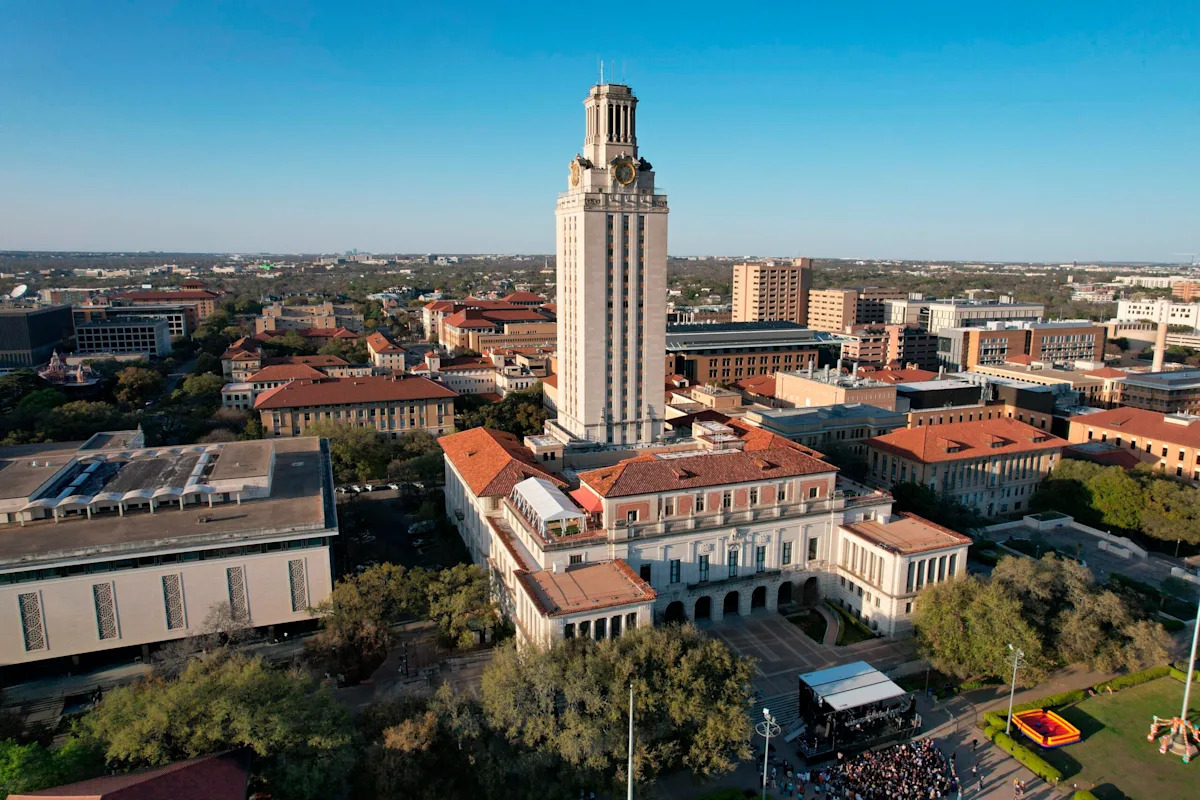Kirby Lee via AP
A federal judge in Austin, Texas issued a preliminary injunction blocking the enforcement of a broad law that imposed sweeping restrictions on speech on college campuses at night and during the last two weeks of each academic term.
Senate Bill 2972, the “Campus Protection Act,” was passed during Texas’ legislative session earlier this year, and amended a 2019 law that had reinforced First Amendment free speech rights on college campuses, imposing a new mandate that state universities adopt new restrictions to “prevent disruption and ensure community safety” in the wake of the protests about the Israel-Hamas War.
Among these restrictions were a ban on “expressive activities” (defined as “any speech or expressive conduct protected by the First Amendment”) between 10 pm and 8 am throughout the year and three prohibitions that applied during the last two weeks of a term: banning inviting guest speakers to campus, amplifying sound, and engaging in “engaging in expressive activities…by using drums or other percussive instruments.”
The Foundation for Individual Rights and Expression (FIRE), a nonpartisan free speech advocacy nonprofit, provided pro bono representation to a group of plaintiffs connected to the University of Texas’ Austin and Dallas campuses that included UT Dallas’ independent student newspaper, The Retrograde, as well as a UT Austin student and several other student organizations.
In a press release published in September after filing the lawsuit, FIRE’s attorneys blasted the Campus Protection Act as “a shocking prohibition of protected speech at public universities,” that granted unconstitutionally broad powers to Texas universities, giving them “the power to discipline students at nighttime for wearing a hat with a political message, playing music, writing an op-ed, attending candlelight vigils — even just chatting with friends.”
FIRE also highlighted the effect the law had on the student paper, because “much of its staff’s newsgathering and reporting necessarily happens after Texas’ 10 p.m. free speech cutoff,” and the student journalists worried about the “risk of being shut down simply for posting breaking news as it happens,” as Retrograde Editor-in-Chief Gregorio Olivares Gutierrez put it.
This law was “an intolerable attack on freedom of speech at public universities, where First Amendment protections must remain indispensable,” argued FIRE.
U.S. District Judge David Alan Ezra with the U.S. District Court for the Western District of Texas, a Reagan appointee, agreed, issuing a 52-page opinion that granted a preliminary injunction barring the state of Texas from enforcing the Campus Protection Act against any of the plaintiffs, at UT Austin or UT Dallas, or “at any institution within the University of Texas System.”
The standard for granting a preliminary injunction is a high burden, requiring the plaintiffs in this case to clearly prove “(1) a substantial likelihood of success on the merits; (2) a substantial threat of irreparable harm if the injunction is not granted; (3) that the threatened injury outweighs any harm that may result from the injunction to the non-movant; and (4) that the injunction will not undermine the public interest.”
After evaluating these factors, Judge Ezra ruled in the plaintiffs’ favor, blocking the Campus Protection Act from being enforced during the litigation process, and signaling that the plaintiffs were likely to prevail in the end (if the case is not settled).
“The First Amendment does not have a bedtime of 10:00 p.m.,” wrote Ezra. “The burden is on the government to prove that its actions are narrowly tailored to achieve a compelling governmental interest. It has not done so.”
Instead, Ezra added, the legislature had granted universities “the ability to weaponize the policy against speech it disagrees with,” contrary to the purposes of the First Amendment, and the government most certainly failed to show the law was narrowly tailored “because it bans all expressive activity for ten hours a day.”
Furthermore, he added, the law failed the overbreadth test by creating “a realistic danger” that it “will significantly compromise recognized First Amendment protections.”
Specifically regarding the restrictions during the last two weeks of each term, the judge noted that because of the way the various semesters and terms were defined at the University of Texas, this ban could conceivably apply “to a total of 98 days of the year at each campus, which is a significant amount.”
The law also was “not limited to speaker events that disrupt academic activities or other end-of-term events,” instead applying “to all speakers, at all hours of the day, at any location on campus.”
“Injunctions protecting First Amendment freedoms are always in the public interest,” wrote Ezra, quoting past federal case law.
FIRE’s attorneys took a victory lap after the ruling. “Today’s ruling is a victory not only for our plaintiffs, but all of those who express themselves on college campuses across Texas,” FIRE senior supervising attorney JT Morris said in a statement provided to Mediaite. “The First Amendment protects their freedom of speech on campus, every hour of the day, every week of the year.”
Added FIRE senior attorney Adam Steinbaugh: “Texas’ law is so overbroad that any public university student chatting in the dorms past 10 p.m. would have been in violation. We’re thankful that the court stepped in and halted a speech ban that inevitably would’ve been weaponized to censor speech that administrators or lawmakers found objectionable.”
The post Federal Judge Blocks Texas Law That Tried to Ban Free Speech at Night on College Campuses first appeared on Mediaite.

